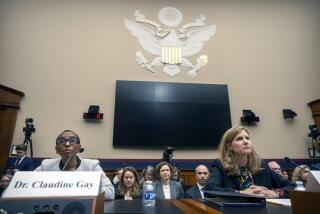Survey Finds Anti-Semitism on Rise in Ex-Soviet Lands : Prejudice: Uzbekistan and Azerbaijan are cited. Researcher warns of ‘dark, primitive feelings.’
- Share via
MOSCOW — Anti-Jewish hostility has intensified in several former Soviet republics, ignited by a combination of nationalism and envy, according to a survey released Thursday.
Anti-Semitic sentiment has increased most dramatically in Uzbekistan and Azerbaijan, two traditionally Muslim lands, the survey showed.
But enclaves of anti-Semitism are scattered around the former Soviet Union, from Central Asia to the Baltic nations to Slavic Belarus, according to the Russian Center for Public Opinion and Market Research, which conducted the poll and compared results to a 1990 survey.
Although attitudes toward Jews appear to have improved in Ukraine and Moldova, center researcher Lev Gudkov warned that as local economies worsen and xenophobic nationalism rises, anti-Semitism may surge sharply in those countries as well.
“Once the initial phase of democratization passes, ethnic tendencies emerge and people begin to feel more and more exclusive,” Gudkov said. “Then dark, primitive feelings begin to surface.”
In Uzbekistan and Belarus, bitter anti-Jewish convictions have already emerged, the survey found. One-fourth of Uzbeks and a like proportion of Belarussians said they believe all Jews should be deported to a Jewish autonomous region in Russia’s Far East.
More than a third of the respondents from Uzbekistan and Belarus said their governments should limit the number of Jews in positions of authority, and only 58% of Uzbeks believe Jews should have equal rights to enter educational institutions.
Belarus, with 115,000 Jews, and Uzbekistan, with 76,000, have the third- and fourth-largest Jewish populations among former Soviet republics after Russia and Ukraine. The survey covered nearly 4,000 people in 10 states and has a margin of error of 3% to 5%.
Although the surge in anti-Semitism in Central Asia and Azerbaijan appears to be rooted in Islamic nationalism there, hostility in other regions may stem primarily from envy of Jews, who are stereotyped as wealthy and privileged, survey results suggest.
About two-thirds of respondents said they think most Jews are rich, a perception that generates considerable anger across the former Soviet Union, which until recently trumpeted its officially classless society.
The exodus of hundreds of thousands of Jews over the past few years has further stoked anti-Semitism.
“Many people are jealous of the Jews because they can go to Israel and can emigrate to the United States more easily than most,” Boris Dobrivker, a Jewish activist in Odessa, Ukraine, commented. “I see the future for Jews here through the darkest glasses.”
In announcing the survey results, Yuri Levada, director of the Center for Public Opinion, gave the statistics a positive spin. “We were pleased to find that aggressive anti-Jewish feelings existed almost nowhere,” Levada said, noting that levels of anti-Semitism were lower than anticipated although some “dark corners” of hatred still thrive.
Yet Jewish leaders said they fear that the survey underestimated the depth of anti-Semitism.
More to Read
Sign up for Essential California
The most important California stories and recommendations in your inbox every morning.
You may occasionally receive promotional content from the Los Angeles Times.













